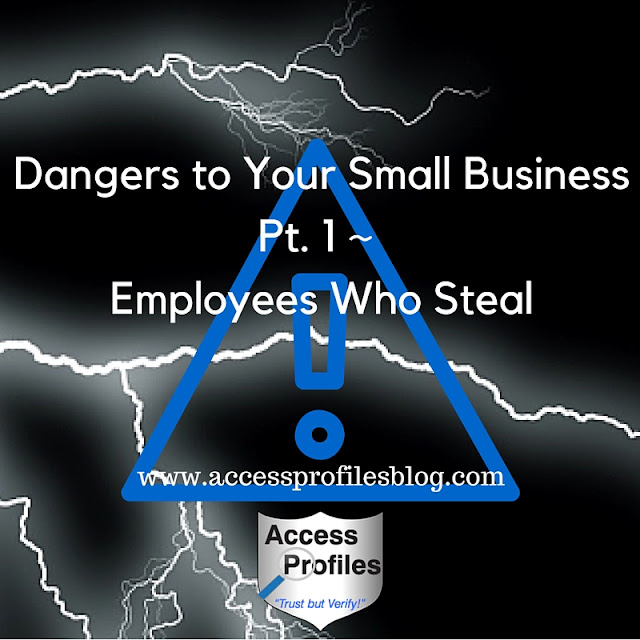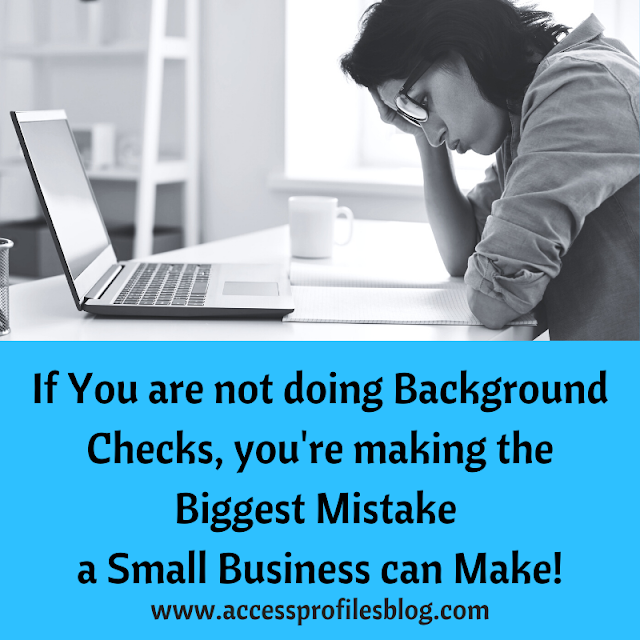
|
Hiring the right employees for your Small Business is an important factor in your success. But what happens when instead of being an asset, that employee actually turn out to be a liability, or even dangerous?
In this 3 Part Series, we will take a look at Employees who can put Your Small Business in Danger. First up ~ Employees Who Steal!
Employee theft is not uncommon. Billions of dollars are lost each year by employee theft, fraud, and embezzlement. And many times the employee that you least expect is responsible.
While workplace theft is harmful to any business, the effect that it has on a Small Business can be devastating.
Take a look at these Employee Theft Statistics released by the Association of Certified Fraud Examiners* on September 7, 2015:
- Percent of Annual Revenue Lost to Theft or Fraud 7%
- Percent of Employees Who have Stolen at Least Once from their Employer 75%
- Percent of Employees Who Have Stolen at Least Twice from their Employer 37.5%
- Percent of Business Bankruptcies Caused by Employee Theft 33%
And as a result, your dream of running your own business is put in jeopardy.
Employee Theft can Ruin Your Small Business! “Tweet This”

Being aware of both how to spot employee theft, and what you can do about it if discovered, can help.
But first, it is important to know some common reasons why employee theft occurs in the first place.
Why employees steal:
Most frequently, employee theft is a result of personal financial problems. A gambling debt or escalating expenses like increasing mortgage payments or medical bills, can all be a factor.
Your employee might turn to stealing from your company as an easy solution to their problems. They will convince themselves that it is a “victimless” crime, that it won’t harm your business, and even that they run little risk of getting caught.
However, no matter what rationale they may use to justify their behavior, stealing from your company can have a lasting effect on the foundation of your small business.
If you are really paying attention, the warning signs are there.
Here are some tips to help you
spot employee theft
in your own small business.
Most employee theft will occur in your accounting, bookkeeping, and finance departments. You will need to be aware of any significant changes in the behavior of any employees who work in those departments. Anything that gives you pause or raises your internal red flag is where you will need to focus your vigilance.
Look for these signs:
- Employees Who are Suddenly Stressed or Complain about Finances ~
- Employees Who are Living Beyond their Means ~
- Employees Who Insist on Working Solo or Who Never Take Vacations ~
- Employees Who Suddenly Change their Work Habits ~
- Employees Who Submit Questionable Travel Expenses ~
- Unusual or Persistent Accounting Discrepancies ~
- An Ongoing or Sudden Problem with Petty Cash ~
- Inventory is Missing ~
While some of these things
might not seem like a huge deal,
over time they can have a significant impact
on your bottom line,
especially for a Small Business.
Even theft by a single employee can harm you.

|
| #SmallBiz #BackgroundChecks |
Tips can Help You Prevent Employee Theft in Your Business:
- Screen Job Applicants Thoroughly
Find out more about fitting the Background Check to the Job Here!
- Develop a Strong “Zero Tolerance” Policy on Employee Theft
Be sure to put your policy in writing and distribute it to all new and existing employees. Have them sign a statement that they have read and understand your policy.
Also set up a system where employees can anonymously report suspected incidents of employee theft ~ and be ready to follow up on them.
The key is to send the message that employee theft will not be tolerated.
- Never Allow Only Person to Control any Aspect of Your Company Finances
Be sure all incoming checks are endorsed “for deposit only”. You might even want to set up a system where larger checks must be handled by more than one employee. As the owner, you should personally inspect all bank statements and look for any red flags ~ checks out of order, unusual payees, etc.
Conduct periodic “surprise” audits on all your books in addition to having a yearly professional audit. Check for any unusual activity or payments being made to a person or company you don’t recognize.
- Form Strong Relationships with Your Employees
Despite your best efforts, you may still find yourself the victim of employee theft.

|
| #SmBiz #EmployeeTheft |
- Document Clearly Each Known or Suspected Instance of Theft
- Check All Your Records for Any Inconsistencies
- Interview Your Employees
- Be Ready to Follow Up on Your Findings
The keys to preventing and identifying employee theft
are knowledge and awareness.
The knowledge begins with knowing as much about your employees as possible both before and after you hire them. This begins with strong screening tools and continues with frequent interaction between employers and employees.
In most cases, employers who take the time to build a trusting and open relationship with their employees will never have to deal with employee theft.
However, turning a blind eye to potential red flags is never in your best interest. Paying attention to the warning signs and questioning anything that seems “off” could save your small business from ruin.
Don't let Employee Theft put Your Small Business in Danger! Using these preventative and follow-up measures will help you protect you and your company!
Authored by
API can help Your Small Business succeed! Visit our Website to find out more About Us and our Background Check Investigation, Business Mentoring, and Security Services.

Let’s Connect! Click on API's Contact Page to find links to all our Social Sites. Thanks!
* Source: Association of Certified Fraud Examiners, Easy Small Business HR, Institute for Corporate Productivity, Jack L. Hayes International, Inc.
http://www.statisticbrain.com/employee-theft-statistics/







